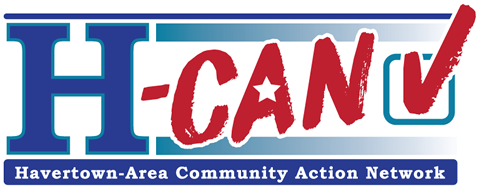October is "Disability Awareness and Acceptance Month" and in accordance with this designation, H-CAN’s and Stand-up 4 Lower Merion’s (SU4LM) Disability and Accessibility Action Group along with Disability Equality in Education hosted "End the Awkward! Modern Language & Etiquette for Talking To & About People With Disabilities ... And What Not To Say ;)” on Sunday, October 21, 2018 at Hope United Methodist Church in Havertown.
This event was presented to members of the general public for the purpose of raising awareness about disability-related issues. About 50 adults and a dozen juveniles were in attendance for the 90 minute event. Messages were communicated through several skits, followed up with discussion and a Q & A segment. The skits touched on topics ranging from mobility related disabilities including wheelchair etiquette, blindness and visual impairment, guide dog etiquette, autism, mental health disabilities, invisible disabilities, allergies, and concepts that are cross disability.
Important Takeaways:
All people have the right of self-determination, including those in wheelchairs or those who use other mobility assistance devices.
Even if you are only trying to be kind, if you think someone might need help, ask, and then respect their answer. Helping when it’s not wanted is not help and can be dangerous.
Don't move someone's wheelchair unless they have given permission to do so.
If you bump someone's wheelchair, say excuse me - it is the polite thing to do when you bump into someone. Wheelchair users often feel that their chairs are extensions of their bodies.
ASSUME COMPETENCE. Often people assume disabled people can’t answer or do for themselves. While for some people, they do need more support and help than others, the most respectful thing you can do is assume the person in question can answer and make decisions for themselves.
Don't speak to or attempt to touch Guide Dogs or Service Animals. They are working. If you aren’t sure if a dog is working, you could ask in a way that doesn’t distract the animal or the owner, but don’t be offended if they say no, or are short with you. Read more info about guide dog etiquette.
Don't move or otherwise touch people who are blind (or anyone for that matter) without their permission.
Speak directly to the person you are having an exchange with. Don't speak to their companions or attendants - Assume competence!
When giving directions to people who are blind, be descriptive and don't point - USE VERBAL DESCRIPTIONS.
Autism is a "spectrum disorder" and presents in different ways in different people. There’s an expression in the Autistic community that when you’ve met one person with autism, you’ve met one person with autism. Don’t assume someone isn’t autistic because they are able to communicate verbally or are able to “pass” much of the time.
Don't ask impolite or inappropriate questions to people with disabilities. If you wouldn’t ask a question to someone else, it’s not appropriate to ask.
Don’t ask someone what’s wrong with them, or what happened. Unless it’s relevant to know this information, and you are just curious, it’s not appropriate. (Kids often get a pass, but everyone has the right to not answer such questions and should not be accused of being rude when they do.)
Don’t patronize or condescend people regardless of their disability.
Just because you can't see a person's disability, it doesn't mean they don't have one. Things like food allergies and mental illness are real disabilities and should be treated as such - they must be taken seriously!
Watch your use of language and don't use terms that are based in negative ideas about disability even if you aren’t aware of anyone with a related disability in earshot.
Don't belittle, joke about, or minimize someone’s disability, food allergy or diagnosis.
Don't use medical or psychiatric diagnoses to describe everyday events and activities. Read the Words Matter handout.
Don't press people to eat foods they are allergic to. Food allergies can be deadly!
RESPECT PEOPLE’S LANGUAGE PREFERENCES.
While many people prefer Person First Language, there are others who prefer Identity First Language as they see their disability as an integral part of themselves and take pride in that. Whatever a person tells you or uses for themselves, respect that and don’t correct them about their own disability language. Read more about person first and identity first language.
BE AWARE AND OPEN-MINDED. STRIVE TO UNDERSTAND.
This recent event was designed to promote discussion and raise awareness about the topics of disability and inclusion. We were not able to cover many topics, but hope that the basic concept of respect will be translated and applied to other interactions one might have with people with disabilities not specifically discussed. From all accounts it was highly successful in accomplishing this goal.


